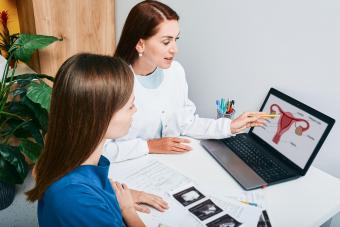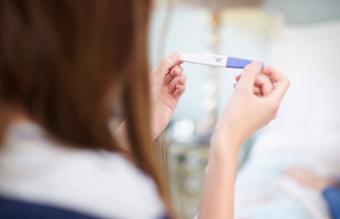
If you're planning to expand your family, it's important to understand which days of your menstrual cycle offer the best chance of conception. These fertile days are different for every woman, and if you have an irregular cycle, it may be especially challenging to pinpoint your ovulation day. However, there are several methods you can use to help determine the best day for you to try to conceive.
Understanding Your "Fertile Window"
For every woman who ovulates, there is a "fertile window" in her cycle. This refers to the best timeframe to try to conceive during any given month. According to a study published in the medical journal, BMJ, this window is about six days long.
Why Only Six Days?
When a man ejaculates and releases semen, the sperm within that semen have a relatively long lifespan. According to the Mayo Clinic, sperm can live outside the man's body for a period of three to five days. This means if the sperm enters the woman's body five days before she ovulates, they may still be capable of fertilizing an egg.
An egg only lives 12 to 24 hours after it is released from your ovary, according to the American Pregnancy Association. Your egg will live for one day and your partner's sperm will live for up to five days, therefore, your best chances of conceiving are the five days before you ovulate and on the actual day of ovulation.
Which Six Days?
In the past, doctors assumed that a woman with a 28-day menstrual cycle was most fertile between 10 and up to 17 days after the start of her period. However, the aforementioned BMJ study found that this window varied significantly from woman to woman and even from cycle to cycle.
- Only 30% of women are actually in their fertile window from the day 10 through day 17 guidelines.
- On average, the study found that most women had at least a 10% chance of being within the fertile window on any day of their cycle from day 6 through day 21.
- Some women are actually fertile before day 10, so day 17 of your cycle might not be the best day to conceive.
- Approximately 5% of women may be fertile in the fifth week of the cycle, or after their period is due.
- Even for women with regular menstrual cycles, ovulation did not happen on the same day of the month for every cycle.
- A woman's ovulation can vary, so do not assume you will ovulate at the same time each cycle.
How to Find Your Best Days for Conception
Ideally, you'll have intercourse every day starting five days before you ovulate and continuing one day after ovulation, covering your six-day fertile window. However, pinpointing that window isn't easy. If you have irregular periods, predicting ovulation can be very challenging, and even if your periods are regular, you may not ovulate on the same day of each cycle. This means you'll need to predict ovulation based on data you collect about your cycle.

According to Discovery Health, many strategies have been developed to help women predict when ovulation is about to occur. Knowing when you are going to ovulate before it happens is crucial because after ovulation occurs, it may be a little too late to conceive.
Physical Changes
A woman's body naturally experiences changes right before ovulation. You may notice vaginal secretions that are slippery and colorless right before the egg enters the uterus. The secretions disappear or they may become thick and cloudy after ovulation has occurred. The changes are subtle and can be very easy to miss.
Some women may notice a small amount of cramping when the egg is released. The discomfort can be difficult to recognize and it may be a sign that ovulation has occurred, which means that having sex in the next 24 hours would be ideal. Physical changes rely a lot on interpretation, and they can be very subtle, which makes predicting unreliable. This low-tech approach to determining when to try to conceive is the least intrusive, but it may not be the most reliable.
Basal Body Temperature
A slight rise in basal body temperature can indicate that you are ovulating. The approach requires you to use a thermometer first thing in the morning before doing anything else. You record the temperature in a basal body temperature record form and then make a note when the temperature changes. This change can indicate you are ovulating. Once again, this method tells you when you ovulate, but it does not allow you to capitalize on the fertile days before ovulation.

Ovulation Predictor Kit
An ovulation predictor kit is the most technical of the strategies, and it can improve your chances of conceiving. The kits take the guesswork out of predicting when a woman is ovulating, and it is less subtle--and less confusing--than other approaches. A woman may also use a fertility monitor that is quite similar to the kits.
The kits and monitors do not require a prescription and are simple to use. The predictor kits and fertility monitors work by testing urine for a spike in specific hormones associated with ovulation. If you notice this spike, it means you will be ovulating within 24 hours.
Don't Wait for the Best Days
If you really want to conceive a child, don't wait for the fertile window to begin having intercourse. If you and your partner have sex every other day for the entire month, you're sure to hit the fertile window and maximize your chances of conception. If you wait for the window which may change from cycle to cycle, you could miss your chance for that month.
Remember that if you're having trouble conceiving, you should talk to your doctor. You may be struggling with infertility, which is the inability to get pregnant after actively trying for one year, or if you are over 35 years old, it is after six months of actively trying without conceiving.
Maximize Your Chances
Understanding your fertile window can give you an advantage when it comes to trying to conceive, but it's important to have intercourse regularly all month to maximize your chances. As long as you don't miss your fertile window entirely, you may find that this is the month you expand your family.







